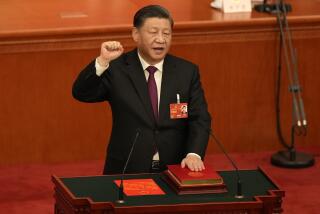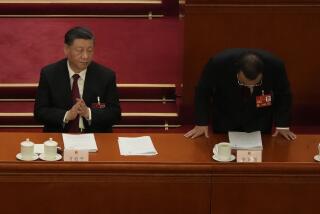A New Generation
- Share via
The people with political clout in China are the approximately one out of every 22 citizens who are fortunate enough to hold membership in the Communist Party. This week 1,936 delegates, the elite of that group, concluded their party’s 13th congress by approving sweeping changes in the nation’s top political leadership and endorsing the goal of continuing economic change.
The congress saw many of the oldest and most familiar figures on the Central Committee gently nudged aside, to be replaced in most cases by technocrats who are younger--for the most part in their 50s and 60s--and who are likely to be far less burdened with weighty ideological baggage. For at least the next five years these reformers will lead the nation. It is their policies that 46 million party members will be asked to help make work.
The reformers, though, may still feel a drag on their efforts. Most of the senior party officials who had opposed and tried to inhibit the scope and pace of reform seem to have been pensioned off, but their continued membership on the Central Advisory Committee, the party’s council of elders, means that they will retain some influence. Even more influence, though, is certain to be wielded by Deng Xiaoping, who bounced back from earlier political disgrace under Mao Tse-tung to become the godfather of the reform efforts that began in 1979. Deng, who is 83, has given up his seat on the policy-making Central Committee. But he will remain as chairman of the party’s most important military body, and he will stay close to his protege Zhao Ziyang, confirmed by the congress as the party’s general secretary.
This new generation of leaders faces a long and problem-filled agenda. The reforms that have produced economic growth have also brought major economic challenges. Three years ago, for example, price controls on most products were eliminated in an effort to bring retail prices into line with actual costs of production and real market conditions. One result has been a booming inflation that for now has forced a halt to price reform efforts. The fear is that if prices are allowed to rise to realistic levels civil turmoil could result.
The Chinese leadership must also wrestle with the old dilemma of how economic liberalization can successfully be carried out without a concurrent relaxation of social and economic restraints. And it must try to bring change and efficiency to a swollen bureaucracy whose inertia and frequent incompetence are now publicly acknowedged. The party congress has undoubtedly strengthened the hand of Zhao and his reformist colleagues. That doesn’t mean that it has assured their work will be made any easier.
More to Read
Sign up for Essential California
The most important California stories and recommendations in your inbox every morning.
You may occasionally receive promotional content from the Los Angeles Times.










